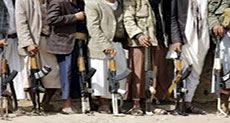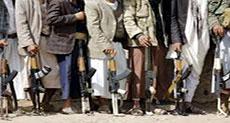Yemenis Doubt the Results of Negotiations: We Got Used to War

Ibrahim Seraji - al-Akhbar
Talk of a ceasefire dominated the gatherings of the people of Sana'a, even before it entered into effect. They were not concerned about it and did not trust the implementation of the agreement.

It seems that their expectations have met reality. Some few hours after the agreement, the aggression warplanes returned to fly over the capital's sky in the first hours of the night, at the same usual timing, but this time it was provocative when the planes exceeded the normal limit as strikes were observed in the suburbs of the city.
The capital's citizens got used to the Saudi strikes, and the issue does not affect the flow of their life any more. However, the citizens of the mountains of Attan and Naqam, the two neighborhoods that were subject to violent shelling in the beginning of the aggression, who were eventually obliged to migrate to their relatives' houses in the capital, returned today to their homes and fixed some damages that they were subjected to. Mohammad al-Assadi said that he fixed some of the huge damages his home was subjected to - like all the houses in the region of Fajj Attan - due to the massive bomb the aggression warplanes dropped on the Attan Mountain in late April, noting that "he doesn't tend to leave his house again, because his family members got used to living under shelling."
As for Said al-Bannan, a resident of the University neighborhood in the center of the capital, he considered that "the most important (thing) is to reach an inclusive lifting of the siege that is imposed on the country by the aggression, to let medicines and drugs inside the country," explaining to "al-Akhbar" that "the Yemenis got used to the war that could not make a big change on the pattern of their lives, nor stop their movement."
Al-Bannan added: "When fuel was available in gas stations, traffic returned to the streets greater than it was before, nobody today looks at the sky when the planes are there to watch the places of the strikes as they used to in the beginning of the aggression."
"The Highest Revolutionary Committee", led by Mohammad Ali al-Houthi, had exerted many efforts to finally contact the United Nations to allow the entry of fuel products that were in short supply again. Such efforts resulted in allowing ships to unload their shipments in the al-Hadida port. The committee put with the Yemeni fuel company a strict system that would allow distributing fuel products in a way that prevents any cheating by the gas station owners or the managers of the stations that belong to the company. In addition, car owners were not allowed to store fuel, they were rather supplied periodically as much as needed.
The availability of oil products reflected on the lives of people in the capital Sana'a, which witnesses unprecedented traffic for two reasons: the first is that people got used to the situation of shelling, and the second is that there were big numbers of families that moved from Ta'az, where battles are taking place against the aggression's mercenaries, and the southern cities of Aden and Abyan where "ISIS" and "al-Qaeda" have control, in addition to the insecurity that was caused as the invasion forces entered the country.
Governmental departments, universities and schools resumed their work hours normally, as well as private companies that endured and did not shut their doors. While the Saudi bombings on the capital used to stop life every now and then, it is no more the same as those sectors resume their work without stopping.
It is worth mentioning that the general atmosphere among the Yemenis is that they are able to defeat the Saudi army in which they interact with very much in the footage distributed by the "military media" for the army and "popular committees" operations in Jizan, Najran and ‘Asir.
Citizens of the capital hold celebrations increasingly after they found solutions to the problem of power cuts, and they start the celebrations with "popular ceremonies" that represent a Yemeni tradition that emerged lately in which poets praise the heroism of the army and the "popular committees", in addition to mocking the Saudi army, noting that those poems are sung with a particular tone and performed with popular dances.
While life in the capital seems to be very normal as the bombings do not affect it anymore, yet the siege imposed on the country is a heavy burden on the lives of the people who find it very difficult to obtain domestic gas and food. However, the main suffering is that the hospitals lack the medical tools and medicines, which makes them unable to offer medical care for the wounded who are transported to the capital from other provinces, or even those with chronic diseases such as kidney failure and cancer.
Dr. Yasser Sarmi, manager of a medicine company, explained to "al-Akhbar" that it was not expected that the country would witness a crisis of medicine and medical tools, because the companies have had strategic storage besides the storage of the health ministry at the beginning of the aggression that was enough for six months. He also noted that "the continuity of the aggression and the siege led to the consumption of the storage." Dr. Sarmi also uncovered that as a result of the measurements imposed by the aggression states, companies are not able anymore to import medicine, except some companies that could at rare times bring in some medicines with more than three times its original cost.
Comments




